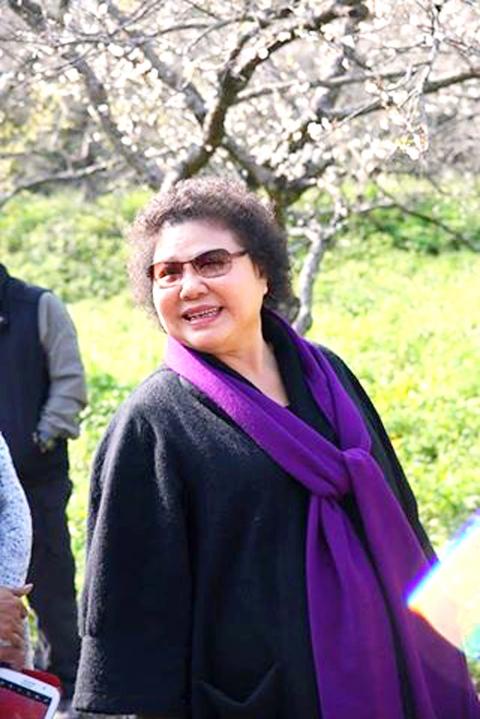The public sees Kaohsiung Mayor Chen Chu (陳菊) as the best performer among 12 of the nation’s political leaders, while President Ma Ying-jeou (馬英九) is ranked as the worst, according to an opinion poll released yesterday.
A Taiwan Mood Barometer Survey conducted by Taiwan Indicators Survey Research (TISR) this week was aimed at determining “favorability” of the politicians — defined as the public’s general impressions of the person’s personal characteristics and how “likable” (好感度) they are.
The Democratic Progressive Party’s (DPP) Chen scored a favorability rating of 72.5 percent, while Ma, a Chinese Nationalist Party (KMT) member, earned a 65.9 percent dissatisfaction rating.

Photo taken from Facebook
Independent Taipei Mayor Ko Wen-je (柯文哲) came in second behind Chen in terms of favorability with 71 percent, followed by DPP Tainan Mayor William Lai (賴清德) with 65.3 percent, KMT Legislative Speaker Wang Jin-pyng (王金平) with 63.6 percent, New Taipei City Mayor and KMT Chairman Eric Chu (朱立倫) with 62.1 percent and DPP Chairperson Tsai Ing-wen (蔡英文) with 60.9 percent.
Scoring less well were new Taichung Mayor Lin Chia-lung (林佳龍) — a former DPP legislator — who received 53.6 percent, former Taipei mayor Hau Lung-bin (郝龍斌) of the KMT with 35.2 percent and Taoyuan Mayor Cheng Wen-tsan (鄭文燦) of the DPP — a former minister of the now-defunct Government Information Office — with 34.4 percent.
Three top KMT politicians rounded out the bottom of the favorability rankings: Premier Mao Chi-kuo (毛治國) with 28.1 percent, Vice President Wu Den-yih (吳敦義) with 22.2 percent and Ma with just 21.8 percent.
Far fewer respondents expressed dissatisfaction with Chen (13.4 percent) or Ko (15.4 percent) compared with Ma and his 65.9 percent rating.
The survey of Taiwanese aged 20 year-old or above was conducted from Monday to Wednesday using computer-
assisted telephone interviewing and random-digit-dial systems. A total of 1,006 valid surveys were collected.
The survey has a margin of error of 3.1 percentage points.

Auckland rang in 2026 with a downtown fireworks display launched from New Zealand’s tallest structure, Sky Tower, making it the first major city to greet the new year at a celebration dampened by rain, while crowds in Taipei braved the elements to watch Taipei 101’s display. South Pacific countries are the first to bid farewell to 2025. Clocks struck midnight in Auckland, with a population of 1.7 million, 18 hours before the famous ball was to drop in New York’s Times Square. The five-minute display involved 3,500 fireworks launched from the 240m Sky Tower. Smaller community events were canceled across New Zealand’s

The Ministry of Foreign Affairs (MOFA) yesterday said it is closely monitoring developments in Venezuela, and would continue to cooperate with democratic allies and work together for regional and global security, stability, and prosperity. The remarks came after the US on Saturday launched a series of airstrikes in Venezuela and kidnapped Venezuelan President Nicolas Maduro, who was later flown to New York along with his wife. The pair face US charges related to drug trafficking and alleged cooperation with gangs designated as terrorist organizations. Maduro has denied the allegations. The ministry said that it is closely monitoring the political and economic situation

‘SLICING METHOD’: In the event of a blockade, the China Coast Guard would intercept Taiwanese ships while its navy would seek to deter foreign intervention China’s military drills around Taiwan this week signaled potential strategies to cut the nation off from energy supplies and foreign military assistance, a US think tank report said. The Chinese People’s Liberation Army (PLA) conducted what it called “Justice Mission 2025” exercises from Monday to Tuesday in five maritime zones and airspace around Taiwan, calling them a warning to “Taiwanese independence” forces. In a report released on Wednesday, the Institute for the Study of War said the exercises effectively simulated blocking shipping routes to major port cities, including Kaohsiung, Keelung and Hualien. Taiwan would be highly vulnerable under such a blockade, because it

UNRELENTING: China attempted cyberattacks on Taiwan’s critical infrastructure 2.63 million times per day last year, up from 1.23 million in 2023, the NSB said China’s cyberarmy has long engaged in cyberattacks against Taiwan’s critical infrastructure, employing diverse and evolving tactics, the National Security Bureau (NSB) said yesterday, adding that cyberattacks on critical energy infrastructure last year increased 10-fold compared with the previous year. The NSB yesterday released a report titled Analysis on China’s Cyber Threats to Taiwan’s Critical Infrastructure in 2025, outlining the number of cyberattacks, major tactics and hacker groups. Taiwan’s national intelligence community identified a large number of cybersecurity incidents last year, the bureau said in a statement. China’s cyberarmy last year launched an average of 2.63 million intrusion attempts per day targeting Taiwan’s critical